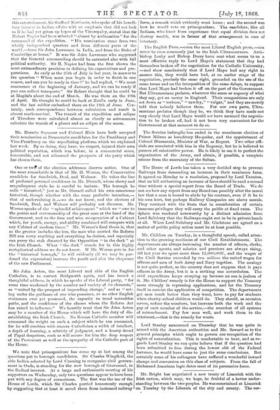Lord Napier of Magdala (whom it seems to be already
the fashion, by the way, to call simply Lord Napier, without any deference to the feelings of the able Governor of Madras, also so termed) was entertained by the East India United Service Club, in St. James's Square, on Monday evening, Sir Bartle Frere in the chair. At
this entertainment, Sir Stafford Northcote, who spoke of his heredi- tary interest in Indian affairs with an emphasis that did not look as if he had yet given up hopes of the Viceroyalty, stated that Sir Robert Napier had been selected "almost by acclamation" for the command of the expedition. 441Iis nomination came from two wholly independent quarters and from different parts of the world,—frorn Sir John Lawrence in India, and from the Duke of Cambridge at home." It was Sir John Lawrence who suggested that the General commanding should be entrusted also with full political authority. Sir R. Napier had from the first shown the most extraordinary precision in defining his expectations and pre- parations. As early as the 25th of July in last year, in answer to the question" When must you begin in order to finish in one season, and can you be ready in time ?" he had replied, "We must commence at the beginning of January, and we can be ready if you can collect transports." Sir Robert thought that he could be at Magdala about the end of March. He was there on the 10th of April. He thought he could be back at Zoulla early in June, and the last soldier embarked there on the 18th of June. Cer- tainly, such correspondence between calculation and result is almost mathematical. The transit of the expedition and eclipse of Theodore were calculated almost as closely as astronomers calculate the transit of a planet and an eclipse of the moon.































 Previous page
Previous page